Dear Reader, in this age of AI created content, please support with your goodwill someone who works harder to provide the human-made. Sign up in the righthand column or bottom of this page. You will receive my hand illustrated monthly newsletter RESTORE NATURE and access to the biodiversity garden design course as I write...and nothing else, I respect your time.
Becoming an eco volunteer:
part time and local
urban greening and permaculture
For those who would love to be an eco volunteer, learn more about permaculture, or organic farming, but cannot afford to take the time off required for Wwoofing, there may
be volunteer opportunities part time and locally. You can get beyond vegetable gardening basics, learn about off-grid living and urban greening while you expand your hands on skill in permaculture, from creating living soil to growing your own trees and learning to make a range of environmentally safe biodegradable green products. It is possible to do all this part time, and still enjoy the benefits of joining a community, giving back and networking with
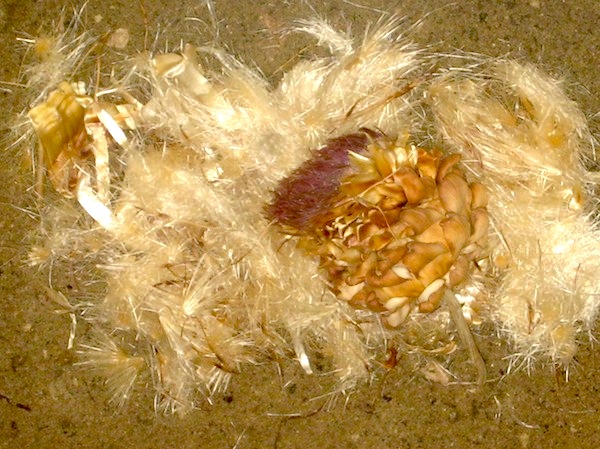
other environmentally friendly people. Eco volunteering can address organic gardening, urban farming, urban agroforestry, tree planting, rehabilitation and conservation.
The perks of part time eco volunteer work
Restore Nature Newsletter
I've been writing for four years now and I would love to hear from you
Please let me know if you have any questions, comments or stories to share on gardening, permaculture, regenerative agriculture, food forests, natural gardening, do nothing gardening, observations about pests and diseases, foraging, dealing with and using weeds constructively, composting and going offgrid.
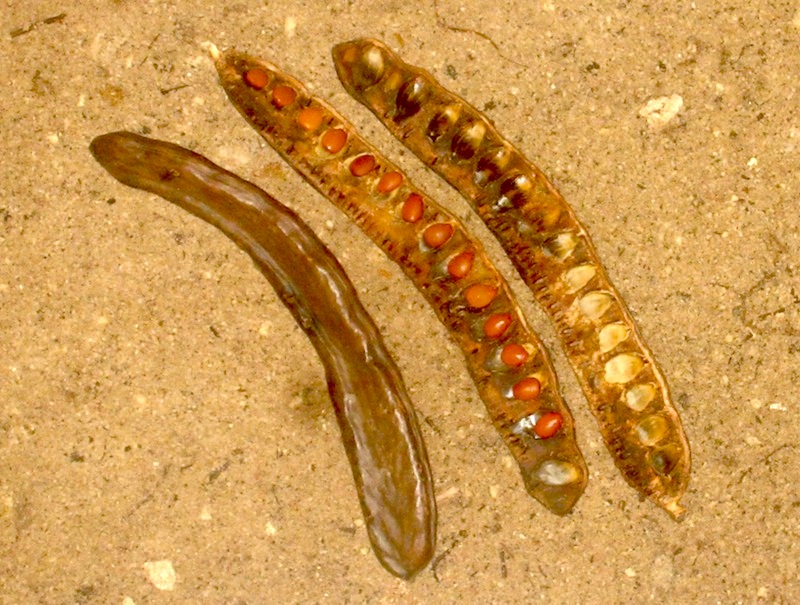 chocolate flavor pods and seeds of the desert stalwart, carob
chocolate flavor pods and seeds of the desert stalwart, carobWhere you can be an urban permaculture eco volunteer
Recently I heard that in response to popular demand, Guerilla House will be running eco volunteer days. This is such good news. It is a chance to expand the learning that occurs in the Guerilla House workshops with ‘learning by doing’ in order to refine skills and perhaps internalize areas of permaculture practice.
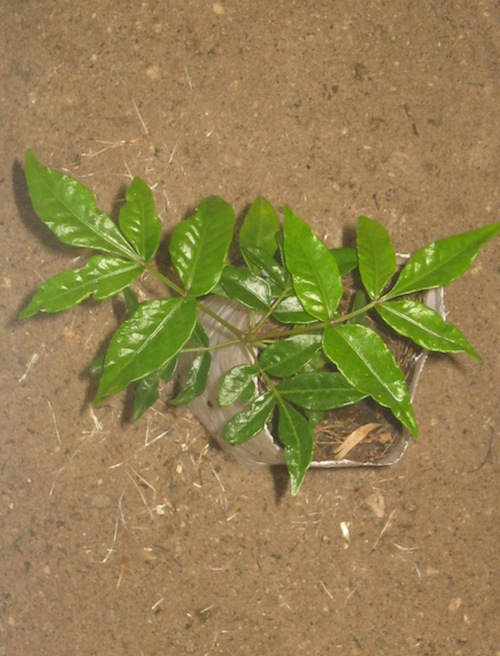 Hardy Harpehyllum caffrum (tart wild plum) grown from seed. Eco volunteers can learn to grow many waterwise food forest trees for regreening projects large and small.
Hardy Harpehyllum caffrum (tart wild plum) grown from seed. Eco volunteers can learn to grow many waterwise food forest trees for regreening projects large and small.Possible fields of practical
learning at Guerilla House
Some of the types of activity Guerilla House suggest introducing as practical learning in the volunteer program were biochar making and plant propagation. I’d also love to try more mushroom growing, retrofitting and making of green products like cosmetics and ferments. This is exciting, I would really like to be part of the program and practice growing plants with other people in a group setting, learning from everyone’s experience. For me it fits in with an ideology of regreening, and on top of that rewilding the city as much as possible in terms of returning to Fynbos Biome plants. More greenness, as has been shown in research world wide on climate change, soil and wastewater management, agroecology, health and wellbeing (see UN review of Agriculture 2013 as one among many sources), would bring greater financial, physical and mental health to the city. This would save certain sectors enormous amounts of money, and justify expenditure on planting urban trees and other vegetation.
 Artichoke heads yield seed, soft down and fine prickles
Artichoke heads yield seed, soft down and fine pricklesWhy learning to grow trees is so important for an eco volunteer
Basic to regreening is having the plant material to do the projects, and learning how to propagate empowers individuals, for their own use, as well as giving impetus to large scale regreening. Trees and labour are prohibitively expensive and eco volunteer work in the nursery can make projects more doable. There are many tough productive
plants already growing in public space in Cape Town, such as the Canary Island date palm and carob, and there are exciting new plants to experiment with and propagate. We can look to areas like the Mediterranean, western Asia and the Americas for new plants and new culinary inspiration. Always necessary to keep in mind is the invasive status of the plants in question. Plants invade when they thrive so much they outcompete native vegetation.
Growing food on the street and foraging
The upside of some invasive plants may be that offer sources of food etc. which can be harvested without a guilty conscience. Plants like fennel, agave and opuntia could be perhaps be eradicated or controlled in the wild through increased exploitation. We just perhaps lack knowledge of the culinary uses in their areas of origin. The east of South Africa was and is also a wonderful source of fruiting trees
 Opuntia an invasive menace. The leaves are eaten in Mexico
Opuntia an invasive menace. The leaves are eaten in Mexicothat have been proven to be very resilient in the Cape too, and non invasive. These are amatungulu, Kei apple and more. This repertoire of KZN foods needs to be expanded to include the more amenable of the traditional leaf vegetables, roots and grains, some of which have become naturalized here in certain locales, like amadumbe, a type of taro.
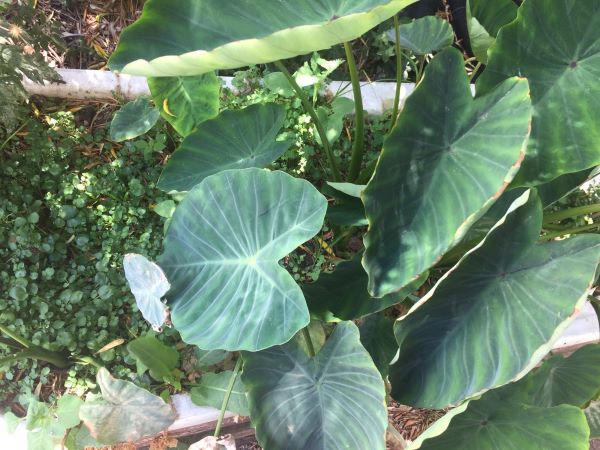 Taro, maize, tumeric and mint in kitchen waste water system
Taro, maize, tumeric and mint in kitchen waste water systemHowever, in our local native Cape Fynbos Biome vegetation we have a plethora of plants that are fabulous additions to the kitchen. We are especially rich in aromatic plants, due to a combination of climate and plant physiology, and many of the aromatics are widely known and commercialized (buchu, honeybush, rooibos etc.) but its only the tip of the iceberg of potential. Then there are the indigenous ‘vegetables’ which are much less known. In my experience they are absolutely delicious (see Loubie Rusch ‘Making Kos’ on facebook, Veld and Sea kitchen on facebook, the Urban Hunter Gatherer, and foraging offers from various wine farms). We tend to stick to the known givens from the colonial days when we have this local corner cornucopia.
 Pelargonium, Rhus, Tetragonia decumbens, nettle, Salvia, Oxalis. Some are vegetables and others flavorants.
Pelargonium, Rhus, Tetragonia decumbens, nettle, Salvia, Oxalis. Some are vegetables and others flavorants.An eco volunteer can help
change tastes
But this need not be so. We as Capetonians would benefit from uncoupling from a very conservative set of basically “western vegetables” lacking in diversity (two kinds of potatoes, two kinds of cabbage, one type of carrot, and so it goes) and learning to acquire new tastes, and create local markets for the products of this new farming. Not only would this expand our culinary experience, increase food security and improve nutrition, it would benefit the environment and the water management of the whole city. Native vegetables require no water and nutrients, and most are semi perennial or live longer than a year.
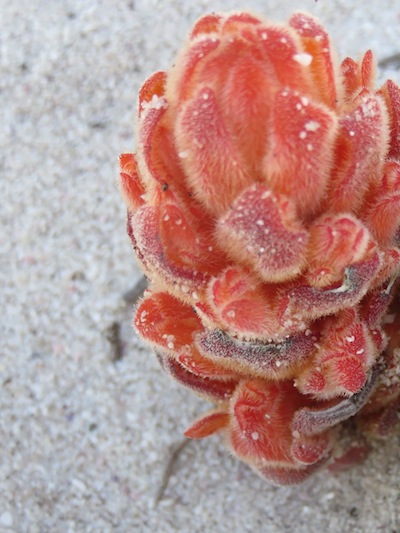 A root parasite A root parasite |
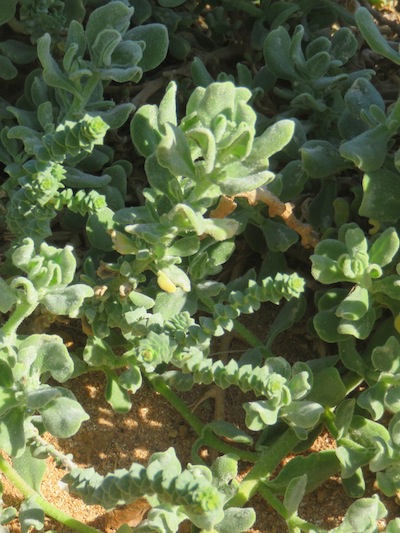 dune spinach dune spinach |
The larger benefits brought by eco volunteers and regreening
Increased permanent vegetative cover could improve our soils and change our climate, reversing the direction of aridity and degradation it has taken. Water saving gardening is a must if we are to survive but so is waterwise farming. See this beautiful article by Gavin van Maneveldt of UWC, whose photographs show an eye that finds our local vegetation exquisite, in all its xerophytic edginess.
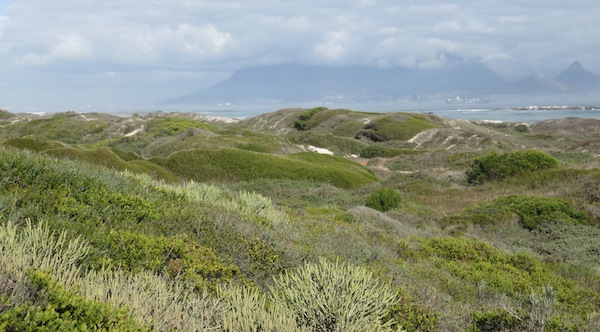 The hunter gatherer's vegetable garden as created
The hunter gatherer's vegetable garden as createdGreat times ahead for eco volunteers
So there are exciting times ahead in terms of vegetable and herb choice, and changing the forlorn appearance and experience of this city. In all likelihood this spreading of green knowledge via networks will lead to a chain of other benefits, a domino effect impacting everything from the

spiritual and aesthetic, to nutrition and gastronomy, the effects of stress on inflammatory disease, air pollution on pulmonary and cardiac disease, richer networks and economic diversification. It should bring an explosion of green cottage industries that serve the new expanding eco markets. It is such a privilege to be part of this. The new ecological, environmental and political understanding
spreading through our city has power to change the appearance of things for the better as well as the less corporeal forces behind these things.
With volunteer learning, knowledge can be shared and made freely available and the green goodness can be spread around. There are so many possibilities for giving and learning in this city. See this article on four Cape Town food gardens.
------
home page for links to more pages on natural gardening
------
SEARCH
Order the Kindle E-book for the SPECIAL PRICE of only
Prices valid till 30.09.2023
Recent Articles
-
Geography Research Task
Jan 31, 25 11:37 PM
To whom it may concern My name is Tanyaradzwa Madziwa and I am a matric student at Springfield Convent School. As part of our geography syllabus for this -
Eco Long Drop Pit Latrines Uganda
Nov 29, 24 02:45 AM
Good evening from the UK. My name is Murray Kirkham and I am the chairman of the International and foundation committee of my local Lindum Lincoln Rotary -
Landscape Architect
Oct 01, 24 10:42 AM
I so appreciate your informative description! Your experimentation and curiosity with the seeds, germination, and rearing of the maggot are exciting to
"How to start a profitable worm business on a shoestring budget
Order a printed copy from "Amazon" at the SPECIAL PRICE of only
or a digital version from the "Kindle" store at the SPECIAL PRICE of only
Prices valid till 30.09.2023





